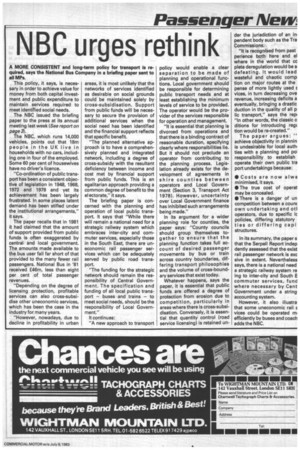NBC urges rethink
Page 17

If you've noticed an error in this article please click here to report it so we can fix it.
A MORE CONSISTENT and long-term policy for transport is required, says the National Bus Company in a briefing paper sent to all MPs.
This policy, it says, is necessary in order to achieve value for money from both capital investment and public expenditure to maintain services required to meet identified social needs.
The NBC issued the briefing paper to the press at its annual meeting last week (See report on page 3).
The NBC, which runs 14,000 vehicles, points out that 18m people in the UK live in households with no cars, including one in four of the employed. Some 60 per cent of housewives have no driver's licence.
"Co-ordination of public transport has been a consistent objective of legislation in 1948, 1968, 1972 and 1978 and yet its achievement has been largely frustrated. in some places latent demand has been stifled under the institutional arrangements," it says.
The paper recalls that in 1981 it had claimed that the amount of support provided from public funds is often exaggerated by central and local government. The amounts made available to the bus user fall far short of that provided to the many fewer rail passengers. National Bus in '81 received £46m, less than eight per cent of total passenger revenues.
"Depending on the degree of licensing protection, profitable services can also cross-subsidise other uneconomic services, which has been the case in the industry for many years.
"However, nowadays, due to decline in profitability in urban areas, it is most unlikely that the networks of services identified as desirable on social grounds could be maintained solely by cross-subsidisation. Support from public funds will be necessary to secure the provision of additional services when the social need has been identified and the financial support reflects that specific benefit.
"The planned alternative approach is to have a comprehensively planned and integrated network, including a degree of cross-subsidy with the resultant deficiency between income and cost met by financial support from public funds. This is an egalitarian approach providing a common degree of benefit to the el ectorate," it says.
The briefing paper is concerned with the planning and operation of local public transport. It says that "While there will remain a national need for a strategic railway system which embraces inter-city and commuter services, especially those in the South East, there are uneconomic rail passenger services which can be adequately served by public road transport.
"The funding for the strategic network should remain the responsibility of Central Government. The specification and funding of all local public transport — buses and trains — to meet social needs, should be the responsibility of Local Government."
It continues: "A new approach to transport policy would enable a clear separation to be made of planning and operational functions. Local government should be responsible for determining public transport needs and at least establishing the minimum levels of service to be provided. The operator would be the provider of the services responsible for operation and management.
"It is essential that planning is divorced from operations and that there is a binding contract of reasonable duration, specifying clearly where responsibilities lie. But it should not preclude an operator from contributing to the planning process. Legislation already exists for the development of agreements in shire counties between operators and Local Government (Section 3, Transport Act 1978). However, uncertainty over Local Government finance has inhibited such arrangements being made."
In its argument for a wider planning role for counties, the paper says: "County councils should group themselves together to ensure that the planning function takes full account of desired passenger movements by bus or train across country boundaries, differing transport philosophies and the volume of cross-boundary services that exist today. Whatever happens, says the paper, it is essential that public funds are offered a degree of protection from erosion due to competition, particularly in areas where there is cross-subsidisation. Conversely, it is essential that quantity control (road service licensing) is retained un
der the jurisdiction of an in, pendent body such as the Tra Commissions.
"It is recognised from past perience both here and el where in the world that cc plete deregulation would be s, defeating. It would lead wasteful and chaotic comp, tion on major routes at the pense of more lightly used s vices, in turn decreasing ove revenue, increasing deficits a eventually, bringing a drastic duction in the quality of all p lie transport," says the rep' "In other words, the classic c, ditions for introducing regt tion would be re-created."
The paper argues: " achieve objectivity in plannin is undesirable for local authi ties with a planning and pal responsibility to establish operate their own public tra port undertakings because: • Costs are now alwa minimised, it says.
• The true cost of operat may be concealed.
• There is a danger of un competition between a counc own undertaking and otl operators, due to specific lc policies, differing statutory ties or differing capi structures.
In its summary, the paper s that the Serpell Report indep dently assessed that the exist rail passenger network is exc sive in extent. Nevertheless says, there is a national need a strategic railway system re ing to inter-city and South E commuter services, fund where necessary by Cent Government under a string accounting system.
However, it also illustra that some uneconomic rail s vices could be operated mi efficiently by buses and coach adds the NBC.




















































































